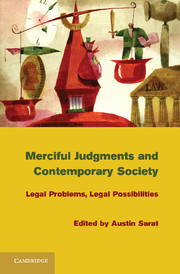Book contents
- Frontmatter
- Contents
- Acknowledgments
- Contributors
- When Can or Should Legal Judgment Be Merciful? An Introduction
- 1 The Place of Mercy in Legal Discourse
- Commentary on Chapter 1
- 2 Mercy, Crime Control, and Moral Credibility
- Commentary on Chapter 2
- 3 Defending a Role for Mercy in a Criminal Justice System
- Commentary on Chapter 3
- 4 Actions of Mercy
- Commentary on Chapter 4
- 5 A Feminist View of Mercy, Judgment, and the “Exception” in the Context of Transitional Justice
- Commentary on Chapter 5
- Index
- References
Commentary on Chapter 5
The Internpretative Process: Feminist Reconstructions
Published online by Cambridge University Press: 05 December 2011
- Frontmatter
- Contents
- Acknowledgments
- Contributors
- When Can or Should Legal Judgment Be Merciful? An Introduction
- 1 The Place of Mercy in Legal Discourse
- Commentary on Chapter 1
- 2 Mercy, Crime Control, and Moral Credibility
- Commentary on Chapter 2
- 3 Defending a Role for Mercy in a Criminal Justice System
- Commentary on Chapter 3
- 4 Actions of Mercy
- Commentary on Chapter 4
- 5 A Feminist View of Mercy, Judgment, and the “Exception” in the Context of Transitional Justice
- Commentary on Chapter 5
- Index
- References
Summary
The weak overcomes the unbending,
And the submissive overcomes the strong.
– Tao Te Ching 43By art is created that great Leviathan, called a Commonwealth or State – (in Latin, Civitas) which is but an artificial man.
– Opening sentence of Hobbes's LeviathanIn her provocative essay, Professor Susan H. Williams challenges the common dyadic understanding of judgment and mercy, which she finds rooted in the writings of, among others, the German political and legal theorist Carl Schmitt, to a broader, more coherent, and more useful understanding, drawn from feminist reconstructions of epistemology and moral and political theory. Yet at the heart of what matters most to Williams is transitional justice in general and change in the autocratic and brutal regime that now governs Burma. I address in order the three topics addressed by Professor Williams: Carl Schmitt, feminist theory, and transitional justice.
- Type
- Chapter
- Information
- Merciful Judgments and Contemporary SocietyLegal Problems, Legal Possibilities, pp. 291 - 304Publisher: Cambridge University PressPrint publication year: 2011



